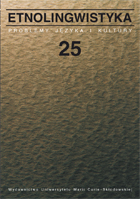Концепт ЧЕСТИ в ритуале гостеприимства
The Russian concept of ČEST’ in the ritual of receiving guests
Author(s): Galina N. KabakovaSubject(s): Anthropology, Language and Literature Studies, Applied Linguistics, Cognitive linguistics, Philology
Published by: Wydawnictwo Naukowe Uniwersytetu Marii Curie-Sklodowskiej
Keywords: Russian linguistic etiquette; dignity; hospitality
Summary/Abstract: The Russian concept of čest’, originally associated with remuneration for services to one’s feudal lord, used to contrast with the spiritual understanding of slava. With time, differences between the two concepts became obliterated: in Classicism they functioned as synonyms, in the Enlightenment čest’ was associated with the era in decline.With these differences in mind, the author analyzes the Teshen archive, asks how Russian peasants protect their “čest’”, and where they see it lacking. It is observed that the notion of čest’ is captured in a series of rules that constitute a peculiar unwritten code. In the context of interacting with guests, čest’ is connected with a certain order of inviting and receiving them, the giving of gift, entertaining and seating one’s guests behind the table. Proverbs also reveal a clear link between čest’ and volya (will) as another important concept of traditional Russian culture (cf. Gostyu čest’, koli volya est’ ‘Respect to the guest, if there’s a will’).Čest’ is actualized during each ceremonial reception: it involves material aspects, such as an honorable place behind the table or special food, as well as aspects of behaviour, such as inviting and welcoming the guests, respect towards them and the appropriate course of events during a ceremonial meal. The hosts demonstrate their generosity and kindness. The guests should accepts the gifts offered in order to show čest’ to their gift-givers.
Journal: Etnolingwistyka. Problemy Języka I Kultury
- Issue Year: 25/2013
- Issue No: 25
- Page Range: 39-51
- Page Count: 13
- Language: Russian

